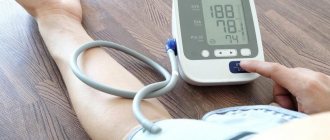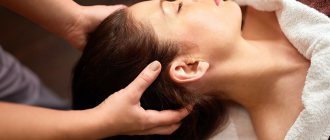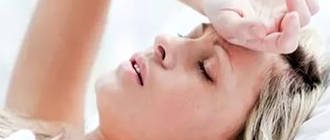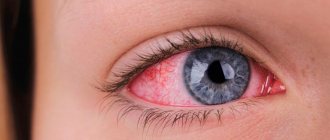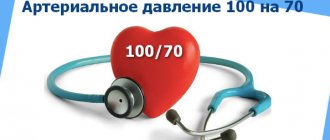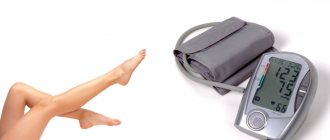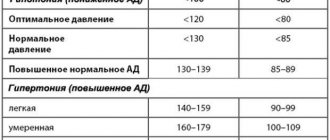Be sure to treat!
I am an experienced hypotensive patient. And I felt good. But six months ago problems began: my blood pressure began to increase, to which I react very hard. Even when the tonometer needle rises to 120/80 (not to mention 130/90), I feel like a complete wreck. When I came to the therapist at the clinic, she made me laugh: they said my blood pressure was returning to normal. You should be happy! But I feel bad. Is the doctor right?
Angelina, Leningrad region.
- No, your doctor is wrong. But, unfortunately, many doctors adhere to this logic. Not only general practitioners, but also cardiologists, who are more focused on diagnosing and treating hypertension.
Uncomplicated hypertensive crisis
Hypertension occurs so often that it has already become something commonplace and familiar, which people brush off: just think, my blood pressure has risen, I’ll take the usual pill, lie down and it will go away. However, everything is not as simple as it seems.
Emergency
Like many chronic diseases, hypertension is fraught with emergency conditions, namely crises. A crisis is an increase in blood pressure (BP) above normal values
, accompanied by clinical symptoms and requiring immediate
controlled
reduction.
“Above the usual values” is important. There is an opinion that hypotensive people cannot have hypertensive crises, but this is not so. When blood pressure increases from the usual 90/60 to 130/80 (which is considered normal according to the generally accepted classification), a person may experience a real crisis.
Hypertension and low blood pressure
People who have crossed the forty-year mark of their age automatically fall into the risk group. But there are cases when this insidious disease affects very young people. Its causes are varied, but the main reason, that is, the root of the disease, is a person’s incorrect lifestyle and poor nutrition. It is generally accepted that a sign of hypertension is high blood pressure.
However, doctors say that this is not the main symptom, since often people come to them with an already diagnosed diagnosis, and their complaints are about low blood pressure. Why does this happen? Low blood pressure in hypertension can be explained by two factors. Firstly, this is the so-called physical inactivity. This happens when a person moves very little for one reason or another. With sustained physical inactivity, the body begins to restructure itself. During physical inactivity, less blood flows to the internal organs. The brain also receives less blood. In response to this, the brain sends a command to the vasomotor center to reduce the pressure.
The organism obeys the command of the main manager of the organism. The second factor is worn-out heart muscle. High blood pressure causes the heart to work harder. And the higher the pressure, the correspondingly greater the load on the heart muscle. When working hard, the heart, in simple terms, gets tired and stops working in the mode that the brain sets for it. The result is low blood pressure. What should you do if you are diagnosed with hypertension and your blood pressure drops? The first thing that must be done is to check the contractility of the heart. It can be detected by simply doing an ECG and echo of the heart.
If it shows normal contractility, then you should do regular physical exercise. Physical education will eliminate the symptoms of physical inactivity, and blood pressure will return to normal levels. You should start physical activity with the simplest physical exercises. They need to be performed a minimum number of times so as not to overtire the body. In this mode, physical training can be continued for several months.
If, during physical training, shortness of breath, discomfort in the heart area, and dizziness still appear, then the loads need to be reduced further. But there’s no point in stopping your classes! All these symptoms are a sign that the body is getting used to new conditions. Traditional medicine recipes can successfully help achieve average blood pressure levels during physical inactivity. Plants that alleviate physical inactivity include: radiola rosea, ginseng root, aralia root, eleutherococcus, thistle leaves. Also, the symptoms of physical inactivity are easily relieved by drinks such as coffee, tea with ginger. It should be noted that hypertension is incurable. This means that the presence of antihypertensive drugs in the first aid kit has not been canceled, even with persistent remission. Hypertensive patients should also know that antihypertensive drugs do not accumulate in the body and cannot be taken for future use. These drugs are completely eliminated from the body within two days. Long-term remission with a diagnosis of hypertension is very rare. It can only be observed in those people who have been ill recently and the disease is still diagnosed as the initial stage of hypertension.
Treatment of hypotension with folk remedies
The “vatness” of a hypotensive person’s existence irritates many of his close and not so close ones. If there are active “electric brooms” in his environment, then against their background a slow hypotonic person, who always looks like he hasn’t gotten enough sleep, makes him want to somehow shake him up. But will this be any good?
Why is he always like cotton wool?
Scientifically, everything happens due to a violation of the regulation of vascular tone, which leads to a decrease in blood pressure - hypotension .
It often occurs in young girls, as well as in pregnant women and in the postpartum period. Overwork contributes to hypotension . adynamia, low-calorie diets, vitamin deficiencies, jet lag, heart defects, tonsillitis, pharyngitis, appendicitis, caries, etc. Alcohol, smoking, and some medications also negatively affect vascular tone. Blood pressure “falls” with weather changes, and in girls, even on critical days.
What is comfort pressure?
For ages 18 to 25 years, blood pressure up to 100/60 mm is considered comfortable. Hg, and older - 105/65. However, numbers do not always determine the state. It happens when the pressure is 90/60mmHg. vigor and efficiency remain, and an increase to blood pressure 130/90 for a hypotensive person will result in a hypertensive crisis .
The main complaints with NCD: weakness, apathy, decreased ability to work, drowsiness, headache, poor memory and sleep, weakness, “wooliness” of the body, capricious appetite, shortness of breath with little physical exertion, irregular heartbeat, constipation, bad breath, general chilliness . Patients do not tolerate heat, stuffy rooms, especially public transport.
Tea? Coffee?
Many hypotensive people use coffee as a tonic . tea. Considering that one teaspoon of natural ground coffee contains 0.1 - 0.2% caffeine, then you can drink three to four cups a day without harm to your health. The drink is valid for up to three hours. Increasing the dose leads to heart rhythm disturbances, constipation, insomnia, and irritability. Do not combine coffee and tea with large doses of chocolate, as this may lead to an unnecessary rise in blood pressure.
Drug therapy for hypotension is recommended only by a doctor. Drugs such as enerion, encephabol, tanakan are not suitable during pregnancy and breastfeeding. Vitamins also require a careful approach, due to possible allergies. To increase sharply dropped blood pressure during hypotension, we can use the harmless drug citramon .
Herbal medicine is an assistant in the treatment of hypotension and unbalanced vascular tone and subsequent hypotension. To prevent hypotension, they are isolated . grapes, ginseng, zamanikha, leuzea, lemongrass, tansy, rosemary, steelweed, tartar, sandy tsmin, yarrow, eleutherococcus.
Here is one of the traditional medicine recipes for the treatment of hypotension . Take 4 parts of immortelle and leaves with flower baskets of tartar, 3 parts of tansy and 1 yarrow. Pour boiling water over 1 tablespoon of the resulting mixture and place on low heat for 10 minutes. Then cool the infusion, strain and take ½ glass in the morning and at lunch. within a month. At the same time, use a mixture of 200g. honey, 50g of walnuts, four lemons, 40g of aloe juice and a teaspoon of pollen, two tablespoons at night. Cedar oil, taken a teaspoon three times a day for three months, also improves tone.
Persistent headaches associated with low blood pressure can be relieved with an infusion of tansy and coriander. wormwood, string and plantain, which is prepared in the above manner.
Here is another folk remedy for treating hypotension . mixture of 100g. rosehip syrup and the same amount of viburnum syrup and 50 ml. Leuzea tinctures. It is taken 1 tablespoon in the morning and at lunch for one month.
And sleep!
For a hypotensive person, proper sleep is important, which should be at least eight hours, and if you grab another hour during the day, it will only be beneficial. Sleeping pills and tranquilizers reduce blood pressure and often cause fatigue, headache and daytime sleepiness, especially since they are contraindicated during pregnancy and breastfeeding. A collection of equal parts of knotweed, immortelle, fireweed, and thyme has a good hypnotic effect. Not far behind is a collection of hawthorn berries, rose hips, valerian roots and chamomile baskets. Drink half a glass of infusion half an hour before bedtime.
No sudden movements!
Remember, it will not be possible to turn a hypotonic into such a living “electric broom”. He acts at his own rhythm. And, believe me, there will be no less time than other “nimble guys”.
If you rise abruptly from bed with hypotension , your blood pressure may also drop sharply, and to prevent this from happening, do not rise abruptly, but first conduct auto-training for 3 to 5 minutes: “My tone and pressure are restored, my head is clear, my brain works clearly. The body is elastic and strong. I don't react to stress. The whole body works clearly and harmoniously. The day will be successful and fulfilling.” After the training, do “stretches” in bed, wave your arms, move your legs, breathe deeply, and gymnastics and a contrast shower will disperse the remnants of drowsiness.
It's better to do without diets
Hypotonic, don’t chase your figure, but chase your health, don’t deny yourself food. It contains your strength and energy! To maintain tone, the diet should be varied, and not morning coffee with a sandwich, then some kind of hamburger, chips and similar “products”. Of course, each person has his own food biorhythm, but for the sake of health it needs to be reconsidered. Eat small portions, but often, 4 - 5 times a day. Be picky about your drinks. Do not drink “heavily carbonated drinks”, which are based on the achievements of chemistry. Apples, gooseberries, sea buckthorn, grapes, cranberries, lingonberries, black currants, rose hips are sources of natural energy and should not be neglected.
will also help fight hypotension . lavender, rosemary, geranium, jasmine. When you feel low, place two drops of your favorite oil on a handkerchief and inhale slowly for five minutes.
When the weather changes and hypotension occurs, you cannot do without homeopathic meteo granules - plus or calm down, and for those who have aching hearts, without cardioika granules. Place five pieces of one of them under your tongue three times a day the day before and continue for another three days after weather storms.
Acupuncture, rational psychotherapy, and hypnosis have a noticeable and long-lasting therapeutic effect on hypotension Charcot's shower, circular shower and hydromassage in the jacuzzi have a good tonic effect. The above aromatic oils are added to a bath with a water temperature not exceeding 37 - 38˚. There is no point in repeating the therapeutic effects of any active recreation, physical education, reasonable physical activity, massage, or swimming. Movement is life and health, especially with hypotension.
And one more thing: raising the pressure once and for all will not work. It’s paradoxical, but true: doctors have learned to lower blood pressure, but not to increase it with the help of medications. Probably not worth it. After all, as practice shows, hypotensive people “grow” into excellent hypertensive people over time...
If you have a proven folk method or recipe for treating hypotension, please leave your feedback in the comments below
Hypotension
Encyclopedia of Health / Encyclopedia of Diseases
It does not occur to sufferers to go to the doctor. Many people don’t even consider hypotension a disease. Just think, low blood pressure... And in a hypotensive person, as the barometer needle drops, his vitality drops to zero.
NOT A SERIOUS DISEASE?
Yes, there is no heart attack or stroke with hypotension. But it greatly interferes with life: dilation provoked by sluggish vascular tone slows down blood flow, disrupts the supply of oxygen to the brain, reducing performance, causing dizziness, drowsiness, fatigue and, quite often, headaches.
Increased excitability, anxiety, sensitivity to cold, a tendency to motion sickness in transport and fainting turn the life of a hypotensive patient into sheer torment. They break his character and leave a painful imprint on his relationships with other people.
Sometimes it comes to serious neuroses, which have to be treated by a psychotherapist.
LINKED BY ONE CHAIN
A special article is for men suffering from hypotension. It has long been no secret to specialists: low blood pressure and decreased sexual function are links in the same chain. Get rid of the first and the second will improve.
Arterial hypotension is not as safe as it seems at first glance for the cardiovascular system. Over the years, structural changes occur in vessels experiencing constant pressure drops. And the hypotensive person becomes... hypertensive.
Even a slight increase in pressure is tolerated by a hypotensive patient almost like a hypertensive crisis.
It is quite difficult to treat such conditions. When prescribing pressure-stabilizing drugs for hypotension, the doctor walks on a razor's edge: the slightest miscalculation is fraught with a sharp drop in blood pressure (collapse). And instant death. Critical conditions and hypotension are generally closely related to each other. Severe blood loss, acute heart failure, shocks of various origins, heat strokes - all these conditions are extremely dangerous, and all are associated with a drop in blood pressure.
OH SPORT! YOU ARE PAIN
In the vast majority of cases, hypotension is a hereditary attack.
If one of your ancestors suffered from dysregulation of vascular tone, it is possible that you will also have problems with blood vessels.
Some diseases of the thyroid gland and adrenal glands (the so-called Addisson’s disease, or “bronze disease”, when very low blood pressure is accompanied by a bronze skin color), cardiovascular and central nervous system, as well as duodenal ulcer, hepatitis, liver cirrhosis, anemia.
Professional factors cannot be ignored either. Among hypotensive people there are many who are associated with “harmful” production (in particular, working with toxic substances and materials) and large physical overloads. Athletes, for example. The tendency to lower blood pressure and their low pulse rate is nothing more than a protective reaction of the body. Doctors call it high-training hypotension.
PRESSURE, LIFT!
Dealing with “low blood pressure disease” is a thankless task. Unlike hypertensive patients, their no less numerous and unfortunate antipodes were unlucky in this sense: no nationwide campaign against the disease, no well-known precautions, no known drugs...
But there are still reasons for optimism. Proof of this is the fairly successful work that has been carried out for many years with a whole group of hypotensive patients within the walls of the Sechenov Moscow Medical Academy. Physiotherapy exercises and medicinal therapy in such classes are necessarily complemented by water procedures, reflexology, and special massage.
You can regulate the pressure yourself. Just to begin with, it’s a good idea to make sure that it really doesn’t reach the “required” values. Pressure below 100/60 mm Hg is considered low. column in men and 95/60 in women. If a tonometer (which would be nice to have in every home) regularly shows exactly this result, start taking action. You have a chance to make your life easier.
* First of all, visit an endocrinologist. It is quite possible that the main source of your troubles is a hormonal imbalance, which, if eliminated, will make you feel human again.
* Hormones have nothing to do with it? Try changing your diet. In addition to traditional coffee and tea, anything salty increases blood pressure: herring, cucumbers, sauerkraut...
* Does not help? Try stimulants of natural origin: tinctures of eleutherococcus, ginseng, lemongrass, pantocrine.
* But be careful with alcohol. In any case, cognac, which dilates blood vessels (and therefore lowers blood pressure), is definitely not for you.
Nitroglycerin and the famous Viagra are prohibited. In combination with hypotension, the already dilating elixir can cause severe collapse.
* Finally, the last piece of advice that doctors never tire of giving: when trying to stabilize blood pressure, do not overdo it. Whether it’s drug therapy or fitness classes, extremes will not lead to good. Try to lead a lifestyle that is most comfortable for you. By the way, this is useful not only for hypotensive patients.

